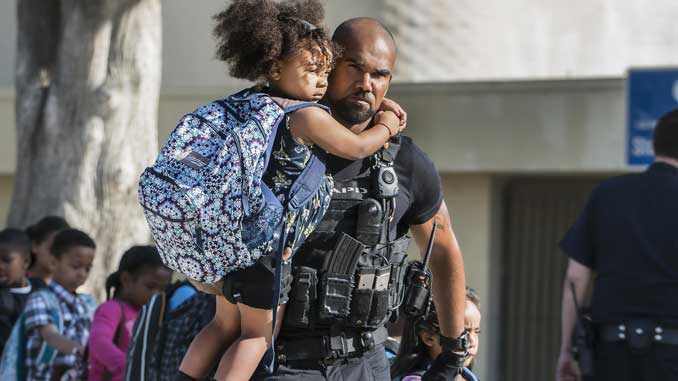
By Langston Bowles-Fulmore
What happens when Blue lives matter as much as Black lives. That’s the dilemma faced by Los Angeles-born Lt. Daniel ‘Hondo’ Harrelson, played by Criminal Minds Actor Shemar Moore. ‘Hondo’ is loyal to both his S.W.A.T. Team and to the community he comes from, as he seeks to curb crime on the streets. Moore’s character embodies this dilemma during a scene in a stealth operation gone wrong.
“Situation gone south, bullets flying. Our neighborhood is torn.” Harrelson explains to Jessica Cortez, his boss, played by Actress Stephanie Sigman, as they lay in bed together, looking back at the events of the day. Cortez responds: “…and not from our bullets, what about the bullet in the kid?”
These and other scenes of the crime drama gripped Xavier University students who were among the first viewers given exclusive access to screen a premiere of the reboot of S.W.A.T. on Oct. 4, 2017 in the University Center. Xavier’s Chapter of the National Association of Black Journalists organized the event. Subsequent screenings of the first few episodes of S.W.A.T will take place at other Historically Black Universities around the country.
S.W.A.T., which is short for Special Weapons And Tactics, is a remake of the 1970’s S.W.A.T series, and will air on Nov. 2nd on CBS. The reboot will shed light on modern day law enforcement challenges such as police brutality and racial injustice. Moore reached out to HBCUs to premiere the series as it focuses on topics that reflect the concerns of young Black students.
“If you want to change the police, join them,” Moore said, during the exclusive screening.
In the real-life police shootings of young Black men, such as Michael Brown, Tamir Rice and even in Louisiana, of Alton Sterling, cops do not always face the ultimate penalty. However, in S.W.A.T., the notion of consequences for cops is a narrative part of the series.
The message behind the first few episodes of S.W.A.T. is to make the community the cops work in – family. Honest dialogue, even though media narratives, is a useful way to bridge the gap between cops and their communities.
“We must continue to tell the story. The good that happens and the ugly things that happen,” said Tia Smith, an Assistant Professor of Mass Communication at Xavier, who teaches about race and media. “The police and Black communities must also listen to each other; over-policing in the Black community is fueled by negative stereotypes of Black women and men. Television can help dispel myths; however, voting to strengthen educational opportunities and economic empowerment may be useful,” Smith added.
This statement hit home with the Xavier students who saw the screening.
“It’s good that the media is taking African-American perspectives into consideration by giving us a show to relate to,” said Prinsey Walker, a Xavier student who helped to organize the event.
Being a police officer is not an easy job, some students said after watching the screening. Sometimes people don’t agree with the decisions cops make, or arguments about policing get boiled down to picking a side, either Blue Lives Matter or Black Lives Matter, the students said. “A show like this lets people know that they are being heard and it is just the kind of show America needs right now,” said Derek Dixon, a sophomore Public Health Major from Oakland, Calif., who attended the screening.
Recommended For You.

Tracee Dundas Fashion Editor @fashionablyyoursnola
As the back-to-school season approaches, Dress for Success New Orleans (DFSNO) is extending a warm invitation


Be the first to comment